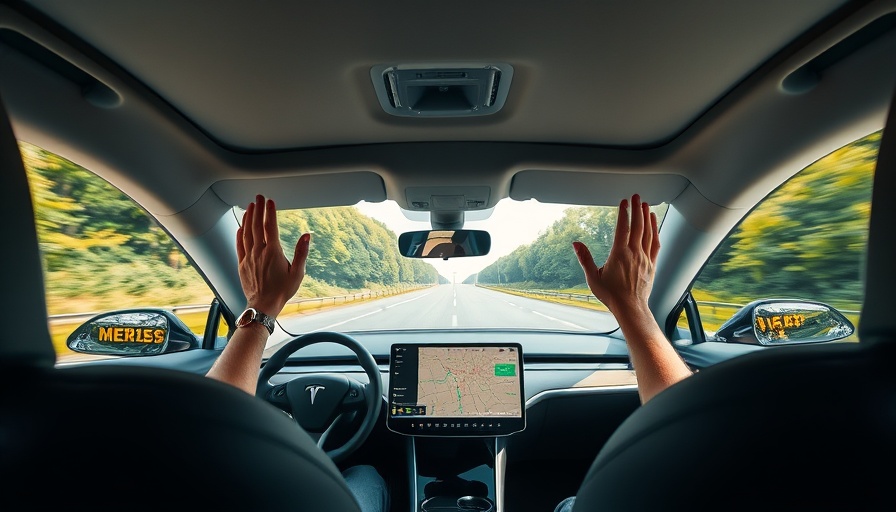
Tesla’s Autopilot Under Legal Scrutiny: What it Means for Consumers
Tesla, the electric vehicle giant led by Elon Musk, is gearing up for a pivotal showdown with the California DMV over allegations that it has exaggerated the capabilities of its renowned Autopilot and Full Self-Driving (FSD) technologies. With its dealer license on the line, the stakes could not be higher for the company as a five-day hearing kicks off in Oakland, California. This legal battle comes during a challenging period for Tesla, already embroiled in a Miami jury trial linked to a fatal crash involving its Autopilot system.
As Musk positions Tesla at the forefront of self-driving technology, he argues that Tesla's vehicles are the safest cars ever made. This claim faces significant scrutiny from regulators, who contend that Tesla's advertisements constitute misleading claims about the true capabilities of their driver-assistance systems. The DMV's accusations focus on statements made by Tesla that imply its vehicles could operate autonomously without driver intervention during trips, which have been deemed “untrue or misleading” in a regulatory context.
Understanding the Stakes: License Suspension and Autopilot Risks
The DMV’s motion to suspend or revoke Tesla's dealership license could have far-reaching implications for consumers and the automotive market. If successful, this action could significantly hinder Tesla’s operations in California, fundamentally altering the sale of its vehicles in one of its largest markets. Moreover, as the legal battles unfold, safety issues related to the Autopilot system resurfaced, particularly following the recall of two million vehicles due to concerns that the system does not ensure driver attentiveness.
The accidents involving Tesla's Autopilot technology have prompted intense investigations by federal regulators. As highlighted by recent lawsuits, the narrative surrounding these incidents has the potential to sway public opinion, affecting not just Tesla's reputation but also consumer confidence in emerging technology and automated driving systems.
Defining Autonomy: What Are the Levels of Driving Automation?
A thorough understanding of automotive technology requires familiarity with the classifications of driving automation. Tesla’s Autopilot is officially categorized as a Level 2 system, meaning it requires constant oversight from the driver, who must remain engaged and ready to intervene. In contrast, higher levels of automation (Levels 3 to 5) suggest progressively autonomous capabilities, where less human input is required. This nuance might be unfamiliar to many car buyers watching Tesla’s ambitious claims which often blur the lines between what the technology can do now and what it may achieve in the future.
Marketing Claims and Consumer Protection
Amid these legal challenges, consumers find themselves in a tricky position. Understanding the subtleties of Autopilot’s actual performance versus what is marketed is essential for vehicle owners—especially those who may find themselves navigating the claims process in the aftermath of an accident. If a driver is involved in an accident while relying on Autopilot features that are not what they were marketed to be, understanding their rights could prove vital.
As Marcus Reid, a seasoned consumer advocate, points out, the importance of clarity in marketing is crucial for consumers who may need to file a car accident claim. When claims are denied or insurance adjusters dispute the nature of an accident involving driver-assistance features, knowledge about these nuances could make a difference between a successful claim and a denied insurance claim.
Common Misconceptions About Autonomous Driving
There are numerous misconceptions surrounding Tesla's autonomous features that consumers must navigate. Some might equate any advertised driver assistance as fully autonomous, leading to expectations that far exceed actual capabilities. Educating oneself on these discrepancies—not only in Tesla's marketing but across the automotive industry—can arm consumers with the knowledge to protect themselves during the claims process.
Final Thoughts: What Actions to Consider?
In light of the ongoing legal battles and the potential impact on Tesla's operations, consumers should remain informed about both the developments in autonomous technology and their rights as vehicle owners. Understanding the situation fully can lead to making informed decisions when it comes to buying, insuring, and utilizing these advanced vehicle technologies.
As this legal saga unfolds, vehicle owners should remain vigilant. Keeping abreast of how Tesla navigates its marketing claims, especially as they relate to safety and consumer transparency, will empower consumers to confront any questionable circumstances they might face regarding insurance claims in the future. Armed with the right information, you can avoid pitfalls often encountered in filing an insurance claim post-accident.
 Add Row
Add Row  Add
Add 




Write A Comment